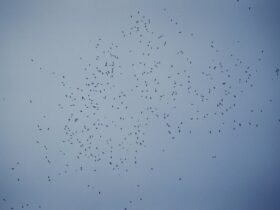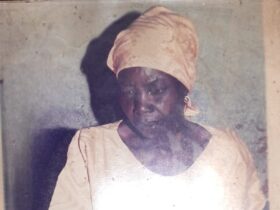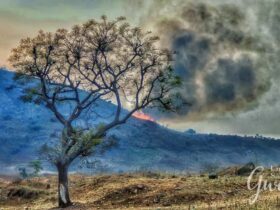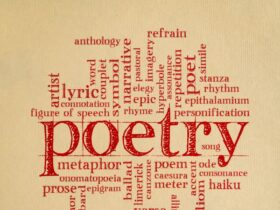I pity my family. One day, this pen will expose their secret lives to the world.
At the time when older children left, I became my father’s closest friend. He’d tell me heart-warming tales about his friends; perceived enemies, family, childhood and his life in the Borgu palace. He’d seek counsel from me. I was just a fresher in his twenties. But my father would come to me seeking counsel on issues I’d never thought about until he asked. And he always did whatever I suggested. By doing that, my father taught me how to think deeply about life at an age when the only things most of my peers think about were shoes, jeans, movies, girls, breasts and condoms. I was together with my peers in our juvenile explorations and, at the same time, I was with my father MANning up about life.
It was a good time. But everything changed from 2016 when I jointly won the WRR Green Author Prize. I returned home with an anthology of poetry featuring some nineteen poems of mine. My father was happy. Proud of me. He took the anthology wherever he went and showed it to people. But our relationship changed. He never told me everything again. One evening, I went to him for some stories about his mother. He smiled and asked me to go. I didn’t. I queried him. Why didn’t he want to tell me about his mother.
This was his response:
You are now a writer. Whatever I tell you about my mother will find its way into a book.
I laughed. It wasn’t funny, but I laughed. And since that day, I knew that the life of the writer is an open window of a house in a Lagos market.

He was right. The reason why I went to him that day was because I woke up with a desire to know more about my father. And, I thought, a child’s history is a balloon with needle-holes without the pipeline linking to the sea a mother is.
History fascinates me— how it is able to fill the numerous voids in the memory of human existence; how it is able to link and reconnect time past and present; how it has been shaping man and human society… And these wouldn’t have been possible for man without writing. Or why do you think God Himself chose the craft of writing in His communication with His creation?
However, my love for history has brought me to a reality— in the pages of history, the present could crumble highly erected walls of the past or rebuild them. I cringe whenever I hear people saying “posterity will judge you.” I know. A day will come when my friends who confide in me will weep. People tell me their secrets. They trust me. They believe I am a good person. Or, maybe, that’s the part of me I show them. A day will come when I will also cry. Because, like the Sufi poet,
I cannot keep for you a secret you couldn’t keep to yourself. A day will come that I’d wish I’d shown people that I am a writer. And it’s great among follies to entrust ones secrets to a writer.
The things about myself, friends and family that I write about, if not for the grace of metaphor and imagery, could result into a communal clash. And writing is supposed to restore sanity and guide the human society. But, wait, is writing supposed to do anything apart from the writing expressing herself, an expression which at the end seems like a shovel-full of sand thrown into a dark out? And writing is also supposed to impress. Isn’t the creation of paradise and hell God’s way of impressing His creation?
Sometimes, I write about the places where I hide money; my most beloved books, coffee, ginger tea packs, condoms and aphrodisiac. You can hardly find what I don’t want you to find in my room unless you go through my writing. When I write about home, my room losses its curtains and becomes open like a village square. I have written about all the girls I knew in poetry and whatever genre some of the writings would call themselves. In most of my writing, I forget form and desecrate the sanctity of style.
I have burnt diaries that exposed the neglect and hypocrisy in my father’s house. The reason why I burnt that diary was because a friend I met on Facebook read some pages from it and concluded that I was broken. She suggested that I looked for help. Three days later, I blocked her and burnt the diary. Since then, I could no longer write on paper again. Because burning a paper that contains my writing seemed like burning God’s holy books. Now, I write on my phone and delete. I find that easier. Sophiyya Ember, a friend who loved my poems, stopped taking me serious after I burnt a manuscript.
I have a diary where I am documenting the things that happened and still taking place in my family. What void we woke up to after the death of a sister and what we have become after father left. What sisters told their brothers because they professed their love for a dead sibling. The more I write about my family, the often I return to my “madness” of burning and deleting manuscripts.
I pity my family. One day, this pen will expose their secret lives to the world.
I have a small collection of stories written in not more than 500 words. But if I’d say anything about this, I’d lose the trust of my friends on Facebook. I might not say a thing about it, but don’t think I am never going to publish it. As a writer, I believe, you don’t decide that you’d publish a certain manuscript. No. I believe that it’s the manuscript that decides when it should be published. You begin a piece of writing by setting out the events you’d love to have in it. But immediately you put down those events, they slip off your fingers and set themselves. At this moment, the events set the writer.
I have failed in keeping my own secrets to myself. If you entrust yours to me, I’d send it to the press a month later. But I am not ready to lose family and friends. So, be at peace. I have stopped exploring history and memory in my writing.

SAI Sabouke is a poet and dervish interested in poetry, essays, Sufi literature and the absurd. His work has appeared in Agbowo, Praxis Magazine Online, The Shallow Tales Review, and elsewhere.
- CALL FOR SUBMISSION: Dear Yusef: Essays, Letters, and Poems For and About One Mr. Komunyakaa - May 25, 2022
- #SubmitNow: Awaiting Revolution Poetry/Essay Anthology - May 21, 2022
- The Straight Path | Adamu Yahuza Abdullah - May 20, 2022













Leave a Reply